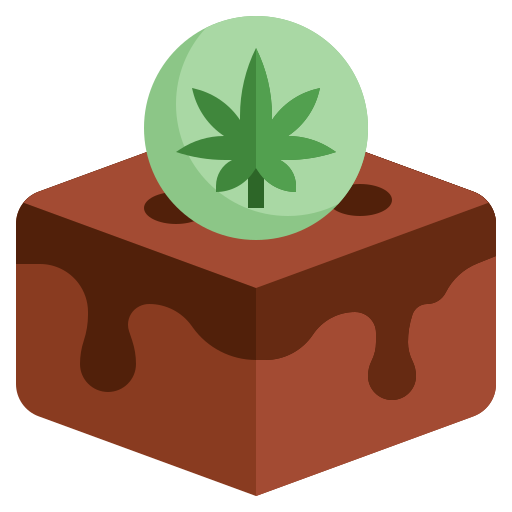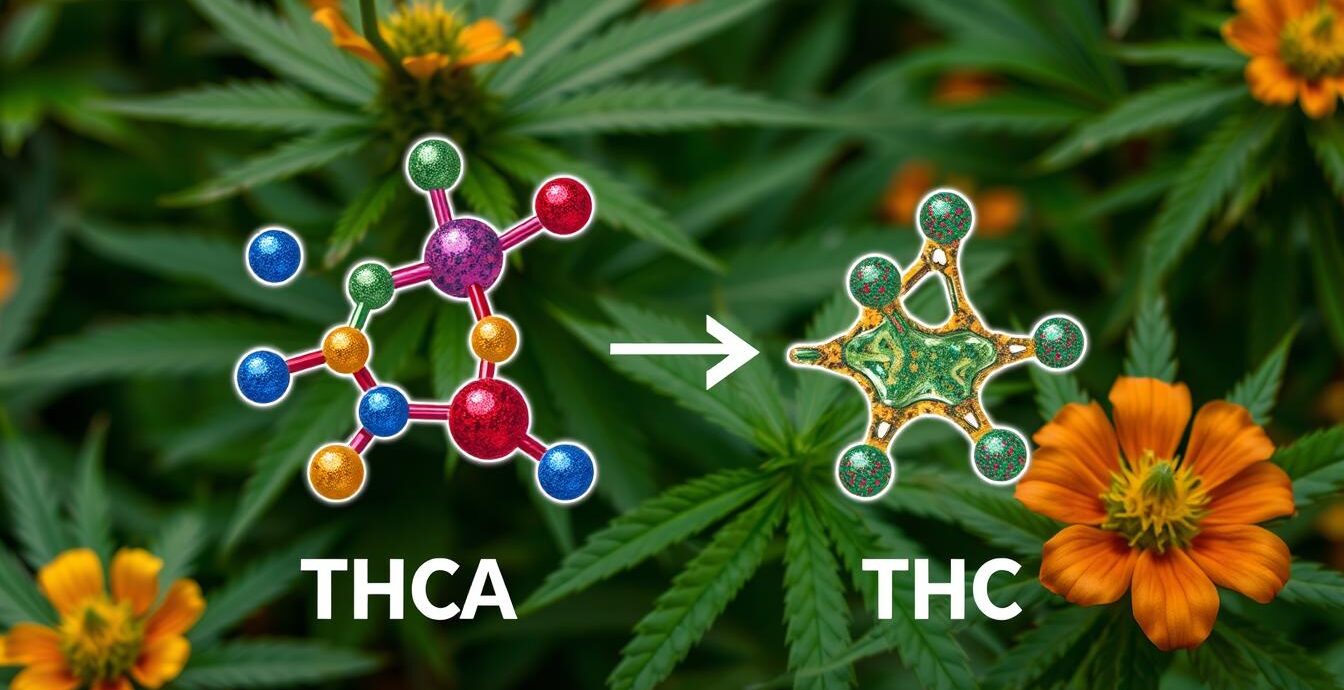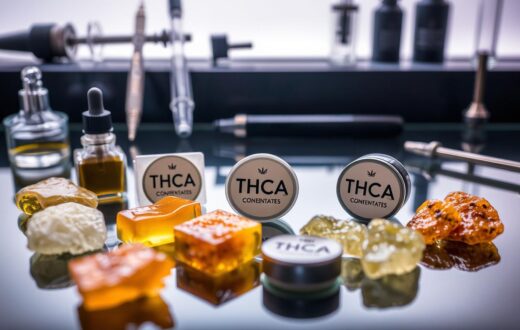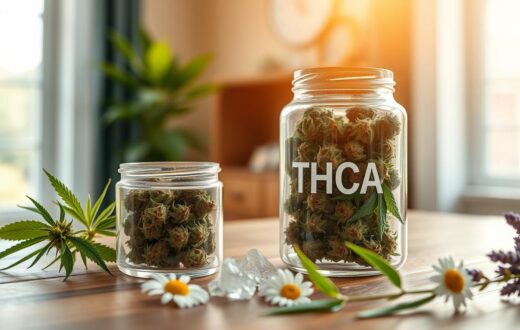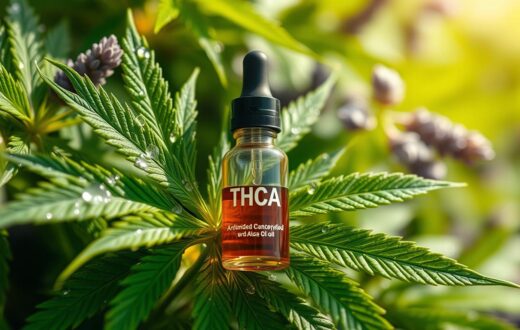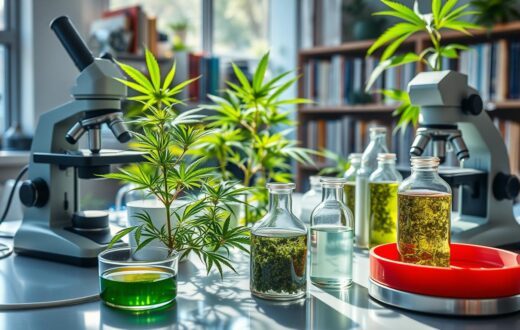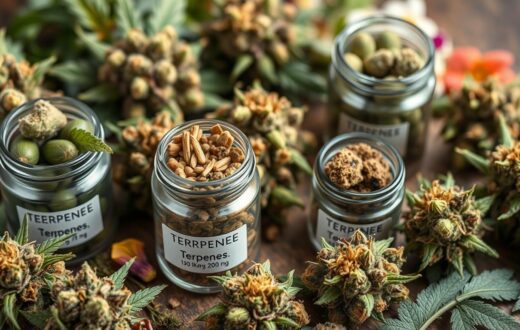Ever wondered why eating raw cannabis doesn’t get you high? The secret lies in a fascinating chemical transformation. Let’s explore the journey from THCA to THC, the compound responsible for cannabis’s famous effects.
THCA, or tetrahydrocannabinolic acid, is abundant in fresh cannabis plants. It’s non-psychoactive, meaning it won’t cause a “high.” But when heat enters the picture, magic happens. This process, called decarboxylation, turns THCA into THC, unleashing its full potential.
The thc conversion from thca is a crucial step in cannabis extraction. It’s not just about getting high – this transformation unlocks THC’s therapeutic benefits too. Understanding this process is key for both recreational users and those seeking medical relief.
The decarboxylation process isn’t just a matter of applying heat. Temperature, time, and starting material quality all play roles. For instance, the optimal temperature range for converting THCA to THC is between 220°F and 240°F. Heating for 30 to 40 minutes typically achieves full conversion.
Interestingly, about 87.7% of THCA converts to THC when heated properly. This percentage stems from the difference in molecular weight between the two compounds. It’s a delicate dance of chemistry that cannabis producers must master to create effective products.
As we delve deeper into the world of cannabinoids, we’ll uncover the science behind this transformation and its implications for cannabis use. Whether you’re a curious newcomer or a seasoned enthusiast, understanding this process is key to appreciating the complexities of cannabis.
Understanding THCA and THC
Cannabis plants have over 500 known cannabinoids. THCA and THC are two important ones. They have different effects on the body. Let’s explore what makes them special and how they relate to THC potency.
What are THCA and THC?
THCA is found in raw cannabis flowers and doesn’t make you high. It might offer health benefits, like through juicing. THC, however, is the psychoactive part that makes cannabis intoxicating.
Key Differences Between THCA and THC
THCA and THC have different effects. THCA doesn’t get you high, but THC does. When heat is applied, THCA turns into THC. This change is key for THC’s potency in cannabis products.
Chemical Structures and Properties
THCA and THC look similar but differ slightly. THCA has an extra carboxyl group. This small difference affects their properties. THCA is studied for health benefits like reducing inflammation and protecting the brain.
THC, with its unique structure, interacts with our body’s endocannabinoid system. This interaction leads to effects like relaxation and increased appetite.
The Importance of Decarboxylation
Decarboxylation is key in using cannabis. It changes THCA into THC, making the plant’s psychoactive effects available. Let’s look at why it’s important and how it works.
What is Decarboxylation?
Decarboxylation is a chemical reaction. It removes a carboxyl group from THCA, turning it into THC. This step is essential for getting the most THC out of cannabis. Without it, cannabis wouldn’t have its psychoactive effects.
How Decarboxylation Occurs
Heating cannabis is the main way to decarboxylate it. The best temperature for this is about 220°F (104°C). At this temperature, THCA loses its carboxyl group, turning into THC. This change happens naturally but heating speeds it up a lot.
Effects of Heat on THCA
Heat changes THCA into THC. This not only increases THC’s potency but also makes it easier for the body to absorb. This means the body can use THC more effectively, improving its benefits. Using the right heat is important for making cannabis products with high THC levels.
Decarboxylation is crucial for making cannabis products that work well. It lets makers control the types of cannabinoids in their products. This is important for both people using cannabis for fun and those using it for health reasons.
The Process of Conversion
The conversion of thc from thca is quite interesting. It turns the non-psychoactive THCA into THC, the psychoactive compound we know. Let’s look at how this happens and what affects it.
From THCA to THC: The Mechanism
The change involves removing a carboxyl group from THCA. This is called decarboxylation. It can happen slowly at room temperature or faster with heat.
At 68°F, it takes months or years for THCA to become THC. But heat makes the process much quicker.
The Role of Temperature
Temperature is very important in this process. At 212°F, most THCA turns into THC in 30-45 minutes. When it gets to 392°F, almost 95% of THCA becomes THC.
Lower temperatures, like 320°F, might result in about 70% conversion. Smoking cannabis causes almost instant decarboxylation because of the high temperatures.
Time Factors in Conversion
Time also plays a big role in converting thc from thca. More heat for longer times means more THC is made. But too much heat or time can turn THC into CBN, changing its effects.
The right time for conversion depends on the temperature and the specific cannabinoid. For THC, 30-40 minutes at 245°F is usually enough. Other cannabinoids like CBD and CBG might need different temperatures and times for the best conversion.
Methods of Decarboxylation
Decarboxylation is key in cannabis extraction, affecting thc potency. We’ll look at three common ways to activate cannabis compounds.
Oven Decarboxylation Technique
The oven method is easy and effective. Preheat your oven to 250°F (121°C). Place cannabis on a baking sheet and bake for 20 minutes.
Look for a color change from bright green to golden brown. This means decarboxylation is complete. This method can produce high thc potency if done right.
Stovetop Decarboxylation Method
The stovetop method uses a double boiler for even heating. It keeps temperatures between 200°F and 290°F (93°C to 143°C). Decarboxylation time ranges from 7 to 60 minutes, based on temperature.
This method is good for keeping terpenes while increasing thc potency.
Sunlight Exposure for Conversion
Sunlight is a natural, slow decarboxylation method. It’s less efficient than heat-based methods but can work over time. It mimics the slow decarboxylation that happens during cannabis aging or curing.
Keep in mind, sunlight may lead to lower thc potency than controlled methods.
Each decarboxylation method impacts cannabis extraction differently. They affect the final product’s potency and flavor. Pick the method that fits your needs and equipment.
Factors Affecting Conversion Efficiency
Turning THCA into THC involves several important factors. These elements are key to maximizing THC levels and achieving the best cannabinoid activation.
Temperature Control
Controlling the temperature is crucial for efficient conversion. The ideal temperature range for this process is between 220°F and 240°F. At this range, about 87.7% of THCA converts into THC.
Quality of Starting Material
The quality and potency of your starting cannabis matter a lot. High-quality THCA flowers can have up to 40% THCA. This means a lot of THC after decarboxylation.
So, the better your starting material, the better your conversion will be.
Duration of Heating
Time is also a key factor in the conversion process. For the best results, heat your cannabis for 30 to 45 minutes at 220°F. This time allows for complete decarboxylation without losing THC.
Using specialized equipment, like those from Hemponix, helps keep the timing and temperature right. This ensures you get the most from your conversion process.
Benefits of Consuming THC
THC, the main psychoactive compound in cannabis, offers various potential benefits. Users often turn to THC for pain relief, nausea reduction, and appetite stimulation. The cbd to thc conversion process is crucial for unlocking these therapeutic effects.
Therapeutic Benefits of THC
Research suggests THC may help manage chronic pain and reduce inflammation. It’s also known to stimulate appetite, which can be beneficial for patients undergoing chemotherapy. Some users report improved sleep quality and reduced anxiety with controlled THC use.
Psychological Effects of THC
THC can induce feelings of relaxation and euphoria. It may alter perception, enhancing creativity for some users. Many people enjoy THC in marijuana edibles for a longer-lasting, body-centered experience. It’s important to note that high doses can lead to anxiety or paranoia in some individuals.
Comparing THCA and THC Effects
Unlike THC, THCA is non-psychoactive but may have its own benefits. THCA might offer anti-inflammatory and neuroprotective effects. The cbd to thc conversion through decarboxylation is necessary to experience THC’s full range of effects. While both compounds show promise, more research is needed to fully understand their potential.
Safety Considerations in Use
Using cannabis products with high THC requires careful thought. THC has benefits, but it’s important to know the risks. It’s key to use responsibly.
Potential Side Effects of THC
THC can lead to dry mouth, red eyes, and memory problems. Some might feel anxious or paranoid. Long-term use of high THC could raise mental health risks.
Risks of Improper Decarboxylation
Incorrect heating during decarboxylation can make products ineffective or cause unexpected effects. It’s crucial to control the heating process for safe results.
Responsible Consumption Practices
Start with small doses and know your limits. Be aware of local laws on cannabis use. Buy from trusted sources for quality and safety.
If you’re new to cannabis or have health concerns, consult a doctor first. Remember, everyone reacts differently to THC. Listen to your body and adjust your use accordingly. Following these tips can help you enjoy cannabis safely.
Legal Status of THCA and THC
The laws about cannabis in the U.S. are complex and keep changing. We have to deal with both federal and state laws that sometimes disagree. This makes it hard for those working in cannabis extraction and THC conversion.
Cannabis Regulations in the U.S.
At the federal level, hemp with less than 0.3% THC is okay. But marijuana is still a Schedule I controlled substance. The DEA says tetrahydrocannabinols, including THCA, are Schedule I. However, hemp-derived THC is fine if the plant has no more than 0.3% THC.
Decarboxylation’s Legal Impact
Decarboxylation makes THCA into THC, which has psychoactive effects. This change can affect a product’s legal status. Raw cannabis with THCA doesn’t get you high, but heating it does. The DEA sees THCA as the same as delta-9-THC after it’s converted.
State vs. Federal Laws
State laws on cannabis are all over the place. Some states allow medical and recreational use, while others ban it. The DEA is looking into changing cannabis’s status under the CSA, possibly moving it to Schedule III. This could make federal rules less strict. Also, the House Committee on Agriculture wants to ban intoxicating hemp products, including THCA.
The Science Behind Cannabis Chemistry
Cannabis chemistry is fascinating to scientists and fans. The plant has over 100 cannabinoids, with THCA and THC being the most important. THCA turns into THC when it’s heated, a process called decarboxylation.
Cannabinoid Biosynthesis
Cannabinoid chemistry begins in the trichomes of cannabis plants. These tiny structures make THCA, the base for THC. When heat is applied, around 230°F for 30-40 minutes, THCA turns into THC. This is key for the plant’s psychoactive effects.
Role of Terpenes in THCA and THC
Terpenes, the plant’s aromatic compounds, are crucial. They work with cannabinoids to create the entourage effect. This mix can change THC’s strength and how it feels. For instance, some terpenes might make THC stronger, while others could lessen anxiety.
Research Advances in Cannabis Science
Recent studies have deepened our knowledge of the endocannabinoid system and cannabinoid receptors. Scientists are looking into THCA’s benefits as an antioxidant and neuroprotectant. They’re also working to improve THC extraction to make products stronger. As we learn more, we find new uses for these complex compounds.
Practical Applications of THC
THC, the active compound in cannabis, has many uses. It goes from THCA to THC through decarboxylation. This opens up a world of possibilities for both cannabis enthusiasts and patients.
Use in Medical Treatments
THC is promising for treating many health conditions. It can help with chronic pain, reduce nausea, and ease muscle spasms. Some studies suggest it has anti-inflammatory and neuroprotective properties.
Patients can get THC-based treatments through medical cannabis programs in many states.
THC in Recreational Settings
For recreational users, THC offers a unique experience. People enjoy its psychoactive effects through smoking or vaping. The conversion from THCA to THC happens when cannabis is heated.
Infusing THC into Edibles
Creating marijuana edibles is a popular way to consume THC. This process involves careful decarboxylation of cannabis to activate THC. Chefs and home cooks infuse THC into oils or butter, which they then use in recipes.
It’s important to measure doses accurately. Edibles can have stronger and longer-lasting effects than other forms of cannabis.
The development of precise dosing methods has expanded THC’s practical uses. From pain relief to culinary adventures, THC’s versatility continues to grow. As research advances, we may discover even more applications for this fascinating compound.
Innovations in Cannabis Products
The cannabis world is buzzing with new extraction techniques. These methods make it easier to get more THC from plants. This is great for those who want stronger products.
New Extraction Techniques
Cannabis extraction is getting better all the time. Companies are using CO2 and special freezing methods to get more THC. These new ways help keep the good stuff from the plant while getting rid of what we don’t need.
Emerging Products with THCA
THCA is the raw form of THC found in the plant. New products are coming out that use THCA. You can now find pure THCA crystals and liquids. These are great for people who want to make their own mixes at home.
Future Trends in THC Consumption
The future of THC looks bright. We might soon see products made just for you based on your body. There’s also talk about making THC easier for your body to use. Some labs are even trying to make THC without using plants at all. These new ideas could change how we use cannabis.
As we learn more about maximizing THC levels, we’ll see even cooler products. From special vapes to new kinds of edibles, the ways to enjoy cannabis are growing. It’s an exciting time for cannabis fans and those looking for new health options.
Environmental Impact of Cannabis Cultivation
The cannabis industry’s growth has sparked discussions about its environmental footprint. We must consider the impact of heating cannabis and cannabinoid activation on our planet.
Sustainable Practices in Cultivation
Cannabis growers are adopting eco-friendly methods. LED lighting systems cut energy use while maintaining optimal conditions for cannabinoid activation. Water recycling systems help conserve this precious resource, vital for plant growth and processing.
Resource Usage in the Cannabis Industry
The cannabis industry’s resource consumption is significant. Indoor growing facilities require substantial energy for lighting and climate control. Heating cannabis for decarboxylation also demands energy. Outdoor cultivation relies heavily on water, which can strain local supplies in dry regions.
The Carbon Footprint of Cannabis Products
Cannabis products carry a carbon footprint from cultivation to consumption. Indoor growing contributes more due to energy-intensive climate control. Transportation and processing, including heating cannabis for cannabinoid activation, add to emissions. The industry is exploring ways to reduce this impact, such as using renewable energy and optimizing cultivation techniques.
As the cannabis sector evolves, balancing product quality with environmental responsibility becomes crucial. Innovations in sustainable practices and efficient cannabinoid activation methods will shape the industry’s future. This ensures both consumer satisfaction and ecological stewardship.
Common Myths About THCA and THC
Cannabis education is often misunderstood. Let’s debunk some myths about THCA and THC to guide you.
Debunking Misinformation
Many think THCA gets you high like THC. But, THCA doesn’t cause a high until it’s heated. This happens when cannabis is smoked or cooked.
THCA has health benefits, like reducing inflammation, without the high of THC.
Clarifying Consumption Myths
Some believe all cannabis products are the same. But, this isn’t true. How you use it changes the experience.
Edibles, for example, take longer to start working but last longer than smoking. Knowing these differences is important for safe use.
Understanding Effects of Different Cannabinoids
Another myth is that CBD turns into THC in the body. But, this doesn’t happen naturally. CBD and THC have different effects.
While THC can make you feel high, CBD is non-intoxicating. It’s often used for its health benefits. Understanding these differences helps you choose the right products.
Future of Cannabis Research
Cannabis research is moving fast. Scientists are exploring new areas in cannabinoid chemistry and THC potency. This research holds exciting possibilities for both medical and recreational users.
Areas of Ongoing Research
Researchers are studying the endocannabinoid system deeply. They’re looking at how different cannabinoids work in our bodies. This could lead to more precise treatments.
They’re also examining the long-term effects of cannabis use. This is crucial for understanding its impact on health.
Potential Health Benefits of THCA
THCA, the raw form of THC, is being closely studied. Early research suggests it might have anti-inflammatory properties. It could also protect nerve cells.
Some studies hint at its potential to fight nausea and slow cancer cell growth. These findings are promising, but we need more research to confirm them.
Innovations on the Horizon
The future of cannabis looks bright. We might see new ways to deliver cannabinoids that make them more effective. Genetic engineering could create cannabis strains with specific profiles.
This could mean plants tailored for particular medical needs or desired effects. The industry is also working on improving THC potency in products.
As research continues, we’ll learn more about the ‘entourage effect’ – how cannabinoids and terpenes work together. This knowledge could change how we use cannabis for health and enjoyment. The journey of discovery in cannabis science is just beginning, and the possibilities are endless.
Conclusion: The Significance of THCA to THC Conversion
The journey through cannabinoids shows how important the thc conversion from thca is. This change, called decarboxylation, turns non-psychoactive THCA into THC. Knowing about this conversion helps us use cannabis fully, for health or fun.
Summary of Key Points
THCA, found in raw cannabis, doesn’t get you high. Heat, around 230°F (110°C), changes THCA to THC. This change is vital for cannabis’s benefits, like easing pain and boosting appetite.
The Future of Cannabinoid Consumption
The future of cannabis looks bright with new products and ways to use them. Advances in vaporizers and extraction methods aim to improve the thc conversion. This means better and safer experiences for users.
Final Thoughts on Cannabis Education
As we learn more about cannabinoids, education is key. Knowing the difference between THCA and THC, their legal status, and effects is important. This knowledge helps users make smart choices about their cannabis use, for health or enjoyment.

